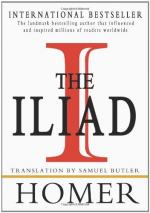|
|
The Iliad Book 1
Homer's tale begins nine years after the Greek arrival at Troy. Nine years previous, the Greek fleet had gathered at Aulis from the area's various city states to depart together in order to reclaim Helen from Paris for her husband Menelaus. Paris was given the love of Helen by Aphrodite in return for presenting her with the golden apple. Paris, having taken Helen from the house of her husband, returned to his father's city, Troy.
The Text begins with an invocation to the muse opening with the broad spectacle of war and narrowing to a specific conflict:
"Rage - Goddess, sing the rage of Peleus' son Achilles,
murderous, doomed, that cost the Achaeans countless losses
hurling down to the House of Death so many sturdy souls,
great fighter's souls, but made their bodies carrion
feats for the dogs and birds
and the will of Zeus was moving towards its end." Book 1, lines 1-6
In this first line Homer, establishes one of this epic's constant themes: Rage, that of Achilles, as well as other major characters. Countless deaths follow this rage in the setting of the Trojan war. This general introduction ends with the conflict between Agamemnon and the main character Achilles. Homer asks:
"What god drove them to fight with such a fury?" Book 1, line 7
Homer does not ask why the two men fight, but what god causes them to fight. He proceeds to answer his own question. Agamemnon has taken the daughter of Apollo's priest, Chryses, as a war prize. Apollo has sent a plague to the Greek armies as retribution for this act. Chryses appeals to the Greeks ( primarily (Agamemnon and Menelaus) offering Apollo's wreaths on a golden staff as a ransom for his daughter. Although the Greek troops desire to appease Apollo, Agamemnon refuses, responding to the appeal with a threat. Chryses prays to Apollo for satisfaction and the god plagues the Greek armies for nine more days.
Topic Tracking: Rage 1
Topic Tracking: Divine Intervention 1
After these nine days, Achilles calls for a prophet to interpret the meaning of the plague. Calchas stands up and asks for protection for what he is about to say. Achilles promises to protect him against any one. Calchas reveals that Apollo is punishing them for Agamemnon's treatment of Chryses. He also advises that Chryseis should be given back to her father without ransom and that an offering of a hundred bulls should be sent with her. Agamemnon insults Calchas, saying his prophecies are always negative, and furthermore, that he prizes Chryseis above all else and will give her up only in exchange for another prize (i.e. woman or treasure). Achilles tells him that there are no more prizes and that the king should wait until Troy has been conquered. Agamemnon threatens to take the prize of another leader in exchange for his loss thereby angering Achilles. Achilles points out that many of the Greek leaders are fighting as a service, not because they were actually harmed by Trojans like Menelaus. Achilles also says that he would rather go home than remain disgraced in Troy. Agamemnon tells Achilles that he might as well leave and that he is going to take Briseis away from him anyway, alleging that this will teach Achilles how much greater the king is than he. Agamemnon remains angry with Achilles because Achilles has overstepped his own bounds in seeking out a seer and calling for a prophecy without consulting Agamemnon. Achilles considers attacking Agamemnon, but the goddess Athena tells him to calm down. If this is done, Agamemnon will suffer eventually and he will profit. Achilles agrees: "if a man obeys the gods they're quick to hear his prayers." Book 1, lines 5-6
Achilles calls Agamemnon a coward and smashes his Scepter, swearing that the Greeks will someday long for Achilles. Nestor pleads with the two men, telling Agamemnon that it is better to lead and encouraging Achilles to not fight. Agamemnon swears that he will not yield to Achilles while Achilles asserts that he would be a coward to submit to Agamemnon's orders. Achilles returns to his own ships.
Topic Tracking: Rage 2
Topic Tracking: Divine Intervention 2
The Greeks return Chryseis and Agamemnon sends men to seize Briseis. Achilles consents, saying that the Greeks will regret this action. Patroclus leads out Briseis. Achilles weeps and begs his mother, Thetis to help him, retelling what has happened so far. Achilles asks his mother to speak to Zeus on his behalf because Zeus is indebted to Thetis for rescuing him from a plot attempted by he other gods. Thetis laments her son's short life and accepts his requests.
Meanwhile, Odysseus returns Chryseis and Chryses asks Apollo to stop the plague. This is followed by a detailed description of sacrifices to Apollo. Apollo ends the plague and the sun sets. The sun rises the next day and Achilles is still enraged. Because Zeus was dining with the Aithiopians, Thetis had to wait twelve days to speak to him. She explains to Zeus that her son has been disgraced and belittled by Agamemnon and asks for retribution. Zeus, quiet for a few moments, curses because he is going to come into conflict with Hera, but pledges to honor Thetis' request. Hera addresses Zeus and taunts him for making secret plans because she is concerned that the Greeks, whom she favors, will be slighted. Zeus tells Hera to mind her own business, but Hera guesses Thetis' request and predicts the deaths of many Greeks as a result of it. Hephaestus begs Hera not to struggle with Zeus and tells her to have patience because he will support her and the Greeks. The sun sets as Zeus and Hera go to sleep.




